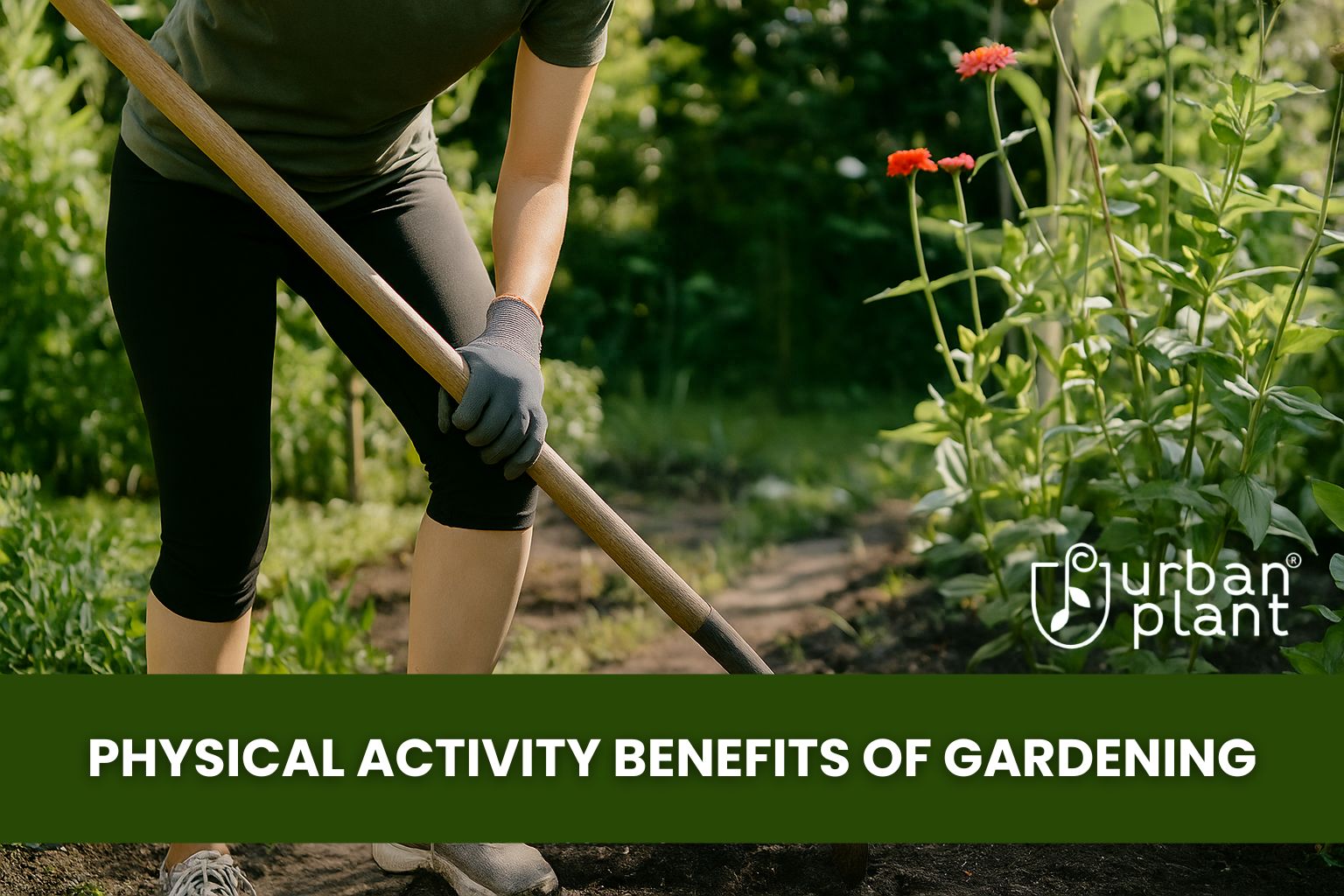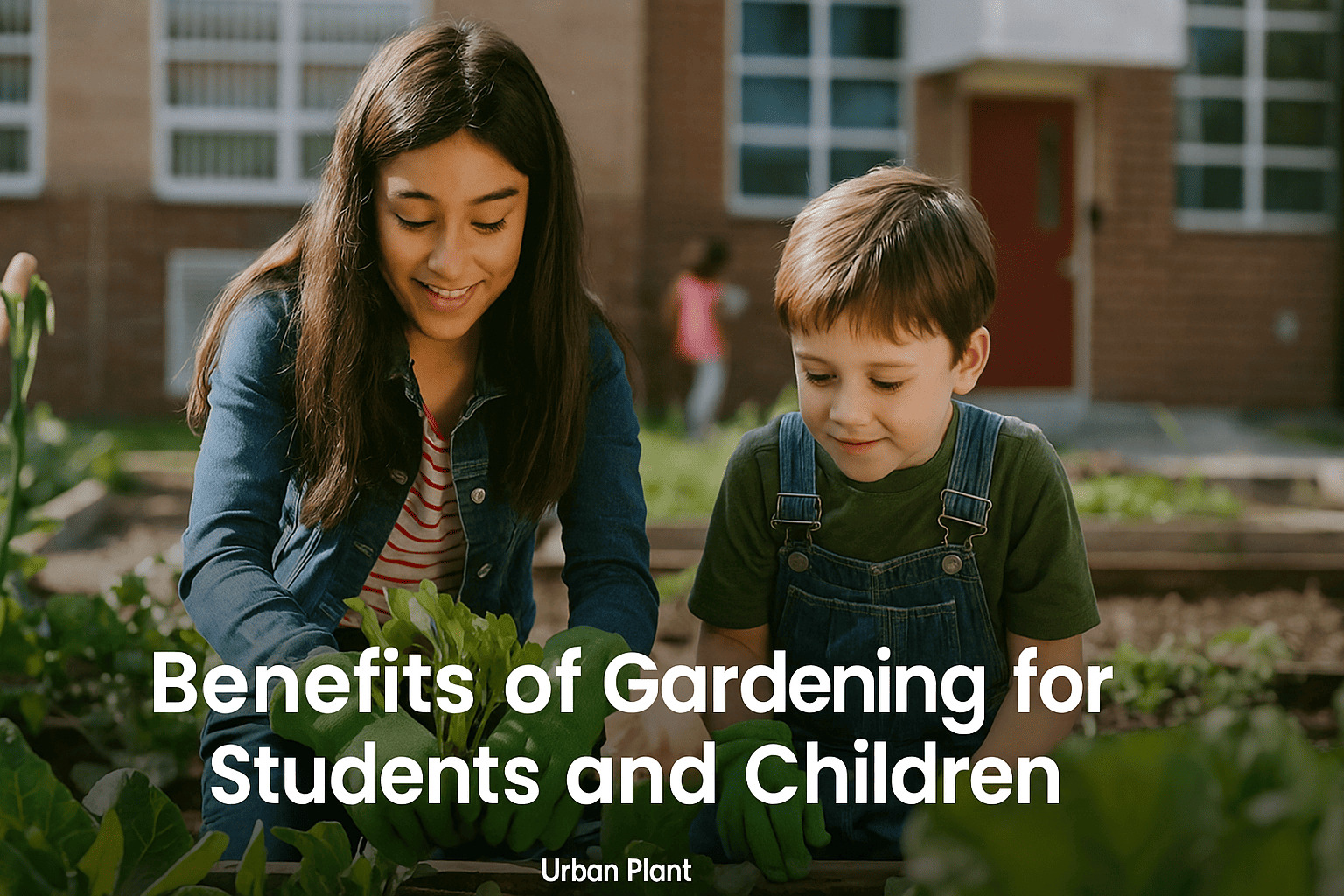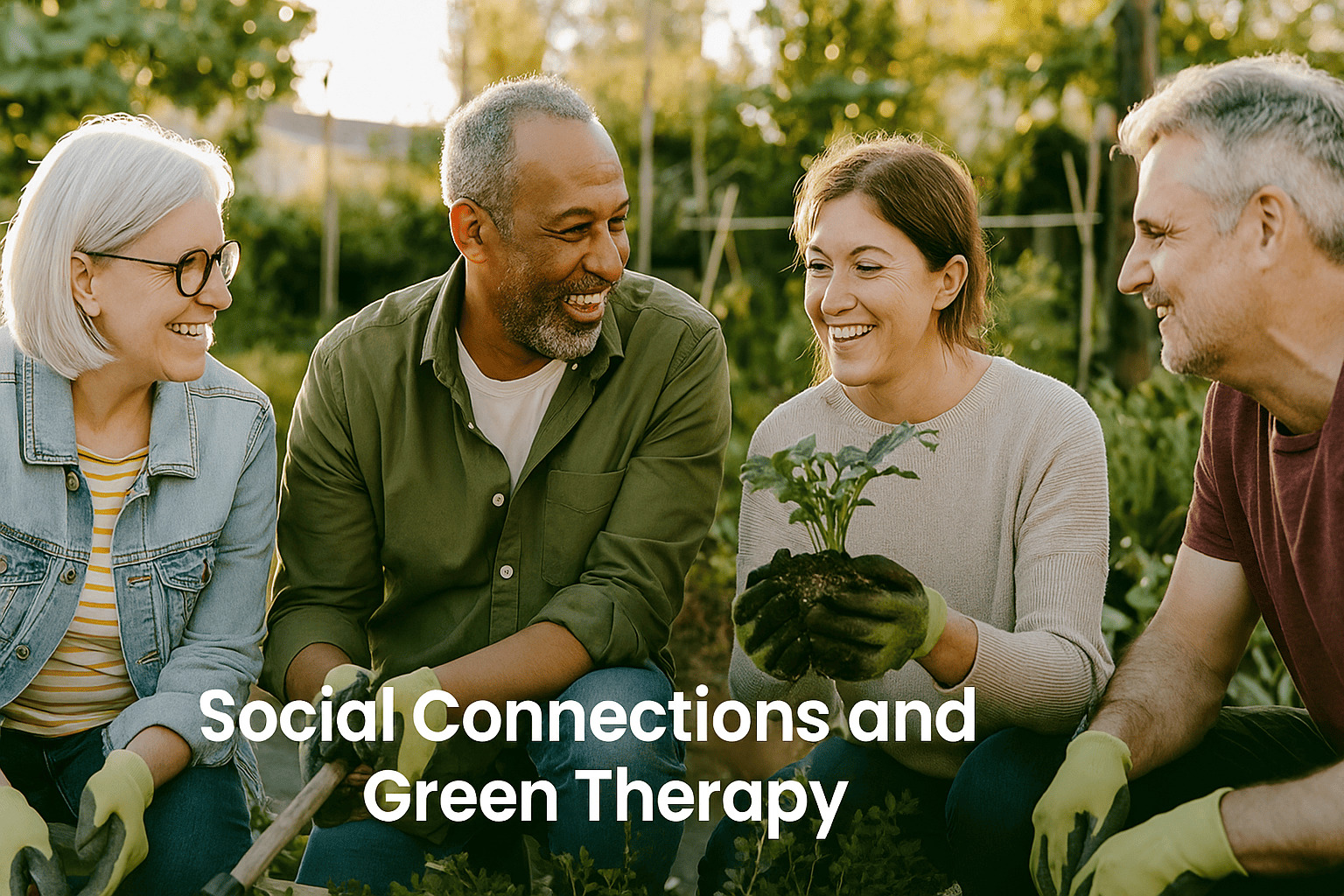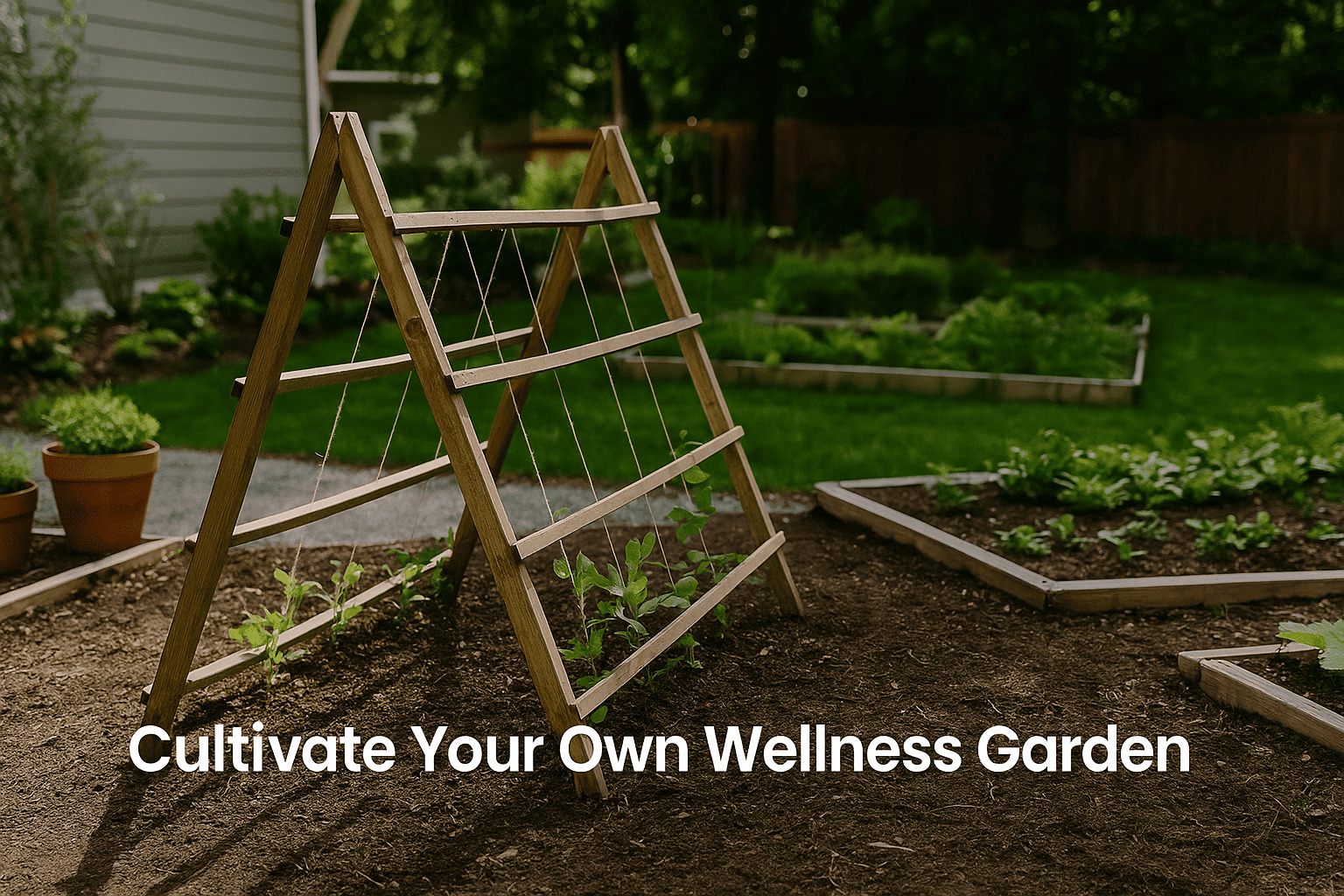.png)
Ever notice how peaceful you feel after tending a few plants? In our fast-paced world, more people are turning to gardening for health – and with good reason.
The simple act of digging in the dirt and nurturing green life yields a surprising harvest of benefits, from stronger bodies to calmer minds.
Science now backs up what avid gardeners have felt for ages: the benefits of gardening extend far beyond a pretty yard.
Whether you’re a stressed professional seeking gardening for mental health and stress relief, a fitness buff looking for new ways to stay active, or a teacher curious about the benefits of gardening for students, this age-old hobby has something to offer everyone.
Let’s dig into how planting a seed can improve your physical health, boost your mood, and even help young minds grow.
A Natural Workout: Physical Activity Benefits of Gardening

Gardening might not look like a typical workout, but don’t be fooled – it can count as serious exercise.
Health experts note that many gardening tasks qualify as moderate-intensity physical activity, comparable to a light gym session.
Think about it: lugging soil, raking leaves, or pushing a wheelbarrow gets your heart rate up and works major muscle groups.
Over a season, the benefits of gardening in physical activity routines can include increased strength, flexibility, and endurance, all while doing something productive and enjoyable.
Gardening gets you moving – digging, watering, squatting, lifting – providing a full-body workout without the boredom of a treadmill.
Even light tasks like watering plants or weeding can burn calories and build strength as part of your daily routine.
1- Heart health and calories burned
Gardening is a heart-healthy habit. Studies have found that people who engage in active gardening have a lower risk of heart disease and stroke, similar to those who engage in traditional exercise.
In fact, spending just 30–45 minutes tending the garden can burn up to a few hundred calories, depending on the intensity.
Mowing the lawn, digging rows, or turning compost all sneak in cardio and strength training.
Over time, these activities contribute to lower blood pressure and better cardiovascular fitness – no gym membership required.
2- Strength, flexibility, and coordination
Ever feel sore after a day of heavy yard work?
That “good ache” is proof that gardening uses muscles you might not use at your desk job.
Pulling weeds improves hand strength and dexterity (great for younger kids and older adults alike), while carrying watering cans or hoeing soil builds arm and core strength.
Squatting to plant seedlings is like doing yoga or lunges; it improves your flexibility and balance.
Gardeners often notice they can bend, lift, and carry groceries more easily after months of working their plot.
All that functional movement means gardening for health helps keep you limber and strong as you age.
3- Immunity and physical wellness
Gardening gets you out in the sunshine – a natural source of vitamin D, which is vital for bone health and immune function.
Plus, exposing yourself to a bit of dirt (yes, dirt!) may even boost your immune system.
The soil is home to friendly microbes that can help our bodies adapt and strengthen defenses.
Researchers have noted that gardeners tend to have lower levels of inflammation than non-gardeners.
Lower inflammation means a lower risk of many chronic illnesses. From a purely physical standpoint, a little dirt under your fingernails is a sign of a healthier you.
4- Nutrition benefits
One often-overlooked perk of gardening as physical activity is the reward it yields – fresh fruits, vegetables, and herbs you grow yourself.
Tending a vegetable patch means you’re more likely to eat those veggies, adding fiber and vitamins to your diet.
In fact, people who grow their own food tend to eat more fruits and vegetables, boosting their nutrition.
It’s exercise with a delicious bonus. Instead of a protein shake after your workout, you could be biting into a ripe tomato you grew – packed with vitamins and flavor.
Gardening closes the loop between physical activity and healthy eating in a satisfying way.
Read More
5 Simple Steps to Create Your Dream Balcony Garden
Must-Have Gardening Tools to Make Urban Gardening Easy in India
Cultivating Calm: Gardening for Mental Health and Stress Relief
Perhaps the most profound benefits of gardening are the effects on mental health.
A garden is much more than rows of plants – it’s a green sanctuary for the mind.
Tending to living things provides a sense of purpose and calm that can greatly reduce stress and anxiety.
In one remarkable Dutch study, participants who gardened for 30 minutes after a stressful task had significantly lower cortisol levels (the stress hormone) than those who tried to relax with other activities.
1- Stress reduction and mood boost
Gardening is essentially a natural stress-relief therapy. The act of caring for plants forces us to slow down and live in the moment.
You focus on the color of the leaves, the moisture in the soil, the warmth of the sun on your back.
These outdoor gardening stands mental benefits trigger our relaxation response.
Studies have found that spending time in a garden can lower blood pressure and reduce levels of cortisol and adrenaline in our bodies.
Many therapists even incorporate gardening therapy in treatment plans (known as horticultural therapy) for people with anxiety, depression, or PTSD.
Instead of reaching for a phone or TV to unwind, grabbing a spade and pulling weeds for a while can be far more effective at stress relief – and you get tangible results to admire afterward.
2- Natural antidepressant in the soil
Amazingly, the soil itself may be contributing to the good vibes you feel while gardening.
Researchers have discovered that inhaling Mycobacterium vaccae, a harmless bacteria found in garden dirt, can increase serotonin production in our brains, leading to reduced anxiety and improved mood.
It’s no wonder that mental health professionals sometimes prescribe gardening the way they would exercise or mindfulness meditation.
3- Mindfulness and purpose
Many people practice gardening for mindfulness without even realizing it. When you’re pruning roses or tying up tomato vines, you’re living fully in the present.
The worries of the day tend to fall away.
This mindful attention can break the cycle of anxious thoughts and overthinking.
Seeing seedlings sprout or flowers bloom under your care can spark joy and self-esteem.
It’s very common to hear gardeners say their hobby gives them a sense of achievement and hope.
Even on tough days, watering your plants or harvesting some lettuce offers a small victory that can lift your mood.
4- “Gardening therapy” in practice
The gardening therapy benefits are so clear that they’re being used in organized programs worldwide.
Hospitals, veterans’ centers, and schools have introduced therapeutic gardens to help people heal.
For example, veterans in one VA Greenhouse program found that horticultural therapy reduced their PTSD symptoms and boosted overall well-being.
And speaking of social benefits – gardening doesn’t have to be solitary. It can also connect people (more on that soon).
The bottom line is that gardening nourishes the mind.
Benefits of Gardening for Students and Children

Gardening isn’t just for adults seeking relaxation – it’s a fantastic activity for kids and young adults, too.
In fact, gardening for students can be downright transformative.
School gardens and youth gardening programs have popped up across the world as educators recognize the multi-faceted benefits for children’s development.
Imagine a group of students in a schoolyard greenhouse, eyes wide with excitement as they see a seed they planted sprouting for the first time.
That kind of hands-on learning sticks with them in ways textbooks sometimes can’t.
1- Hands-on education and engagement
One of the greatest benefits of gardening for students is turning abstract concepts into real-life experiences.
Instead of reading about plant biology in a book, kids can learn science by gardening – observing pollinators visiting flowers, measuring how sunlight and water affect growth, and understanding ecosystems by tending their own small plot.
This active learning keeps students engaged and attentive.
Teachers often report that even kids who struggle in a traditional classroom environment come alive in the garden, asking questions and taking initiative.
The garden essentially becomes an outdoor classroom, where subjects from biology and ecology to math (counting seeds, measuring soil) and even art (sketching plants) come to life.
2- Responsibility and confidence
Tending a garden teaches kids responsibility in a fun way.
They learn that if they don’t water or weed, their plants suffer – a direct lesson in consequences and caretaking.
Many children take great pride in “their” plants, eagerly checking each day for new growth. This nurtures a sense of ownership and accomplishment.
A child who may not excel in sports or academics might discover a new confidence as the resident “gardener” who grew the tallest sunflower or the tastiest strawberries in class.
Gardening therapy benefits aren’t just for adults; for kids, gardening can improve self-esteem and patience.
One long-term study found that youth who garden develop better self-understanding and cooperative skills.
3- Healthy habits and nutrition for students
Getting kids involved in gardening can kick-start lifelong healthy habits.
For one, it gets them moving – pulling weeds, digging holes, and running around the garden are physical activities that beat sitting indoors. Students also learn about nutrition and where food comes from.
Many school garden programs tie in lessons about vegetables and cooking.
The effect? Children are significantly more likely to taste and eat vegetables that they grew themselves.
4- Social and emotional growth
School and community gardens also cultivate social skills in young people. Working side by side in the soil, students learn teamwork, communication, and empathy.
They have to plan together, divide tasks, and help each other out – just like any team project, but with the added joy of being outdoors.
Gardening can be particularly beneficial for students who struggle with traditional classroom behavior or social interactions.
The relaxed, hands-on nature of garden work provides a different setting where they might thrive.
For children dealing with stress or trauma, watering plants or caring for a quiet garden nook can be therapeutic, much like it is for adults.
In sum, the benefits of gardening for students range from better test scores and healthier eating to stronger friendships and happier minds.
Social Connections and Green Therapy

Gardening’s impact isn’t confined to individual health – it can blossom outward and benefit families, communities, and the environment. Tending a garden often brings people together.
In cities, community gardens transform empty lots into lively social hubs where neighbors of all ages and backgrounds connect over a shared love of plants.
1- Family bonding
Gardening is a wonderful family activity as well. Parents and children (or grandparents and grandkids) can bond while planting and harvesting together.
It provides quality time away from screens and daily stresses.
Many families find that working on a backyard garden teaches kids teamwork and creates cherished memories – whether it’s a toddler proudly watering the tomatoes or a teen grilling home-grown veggies for dinner.
The happiness and stress relief gardening provides is amplified when shared with loved ones.
2- Therapeutic communities
There’s also a broader therapeutic aspect when people garden together. Gardening therapy benefits extend to group settings, such as community center gardens or support group gardening clubs.
For example, community gardens have been used in senior centers to help older adults stay active and socially engaged – the garden gives them a reason to get outside, gentle exercise to keep their bodies moving, and social interaction to brighten their days.
In mental health support groups, tending plants as a group can create a calming routine and a sense of shared purpose.
3- Environmental stewardship
Let’s not forget that by gardening, we also give back to Mother Earth. Urban gardeners help green their cities, improve air quality, and create little habitats for pollinators like bees and butterflies.
Students and adults alike develop a deeper appreciation for nature and sustainability through gardening.
Many first-time gardeners start to compost, collect rainwater, or avoid pesticides once they feel invested in their plants and soil.
These eco-friendly practices have ripple effects on community health – fewer chemicals and more green space benefit everyone.
Gardening can thus be a gateway to broader environmental action.
Cultivate Your Own Wellness Garden

By now, you might be itching to grab a trowel and experience these benefits for yourself.
The beauty of gardening is that you can start small and still reap rewards. Live in a city apartment?
Try a few pots of herbs or a sturdy planter on your balcony – even a tire garden can work in a pinch!
If you have a yard, you could begin with a simple 4x4 ft raised bed or a corner for flowers.
The key is to choose plants that fit your space and lifestyle.
Herbs and leafy greens grow well in containers, while hearty veggies like tomatoes and peppers just need a sunny patch and regular watering.
No experience? No problem
Gardening is a learn-by-doing journey, and there are many resources to guide you.
For absolute beginners, consider using a ready-made Urban Plant gardening kit that comes with seeds, soil, and instructions – it takes the guesswork out for your first try.
Starting with a kit or a few easy plants (think marigolds, basil, or lettuce) can build your confidence.
As you nurture these first sprouts, you’ll naturally develop a feel for how much water and sun they need. Before long, you’ll be leafing through seed catalogs and planning bigger projects!
Maximize small spaces
If you’re an urban gardener with limited room, creativity is your best tool.
Use containers and planters to turn any ledge or windowsill into a mini-garden.
Vertical gardening is another great hack – try hanging planters or wall-mounted pockets for herbs.
Many Urban Plant pots & planters are designed for small spaces, letting you grow upwards or in tight corners. Even one pot of flowers by your front door can brighten your mood each day.
A harvest of health
Ultimately, gardening is the hobby that gives back in so many ways.
You might start out aiming to grow some fresh veggies, and end up gaining a whole new appreciation for your body and mind.
As the plants thrive, often so do you.
So grab a packet of seeds (Urban Plant’s seed collection has plenty of easy options to try) and plant a small dream.
No matter how humble, that little garden can be your sanctuary of health.
FAQ: Gardening for Health and Wellness
What are the mental health benefits of gardening?
Gardening supports mental health by reducing stress, anxiety, and depression. It boosts mood through exposure to soil microbes, encourages mindfulness, and provides a calming routine that promotes emotional well-being.
How does gardening help in physical activity and fitness?
Gardening includes moderate physical activity such as digging, planting, and weeding, which improves flexibility, strength, and cardiovascular health. It also helps burn calories and contributes to overall physical fitness.
Can gardening help reduce stress and anxiety?
Yes, gardening is a proven stress-relieving activity. It lowers cortisol levels, provides a sense of control and purpose, and engages the brain in mindful, repetitive tasks that calm the nervous system.
What are the benefits of gardening for students?
Gardening helps students improve concentration, responsibility, and academic performance. It enhances hands-on learning, boosts nutrition awareness, and reduces screen time, fostering healthier habits and emotional resilience.
Why is gardening good for your health?
Gardening benefits health by promoting physical exercise, improving mental wellness, encouraging healthy eating, and reducing the risk of lifestyle-related diseases. It also enhances sleep and immunity through nature exposure.
Conclusion
By embracing gardening, you invest in a hobby that nurtures your mind, body, and community.
From lowering stress to increasing strength – and even boosting students’ growth – the benefits of gardening are far-reaching.
So, whether you have a sprawling backyard or a single sunny windowsill, consider starting your own little garden.
Your future self, smiling and maybe a bit muddy, will thank you.





